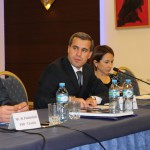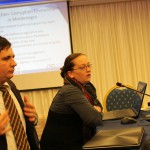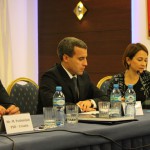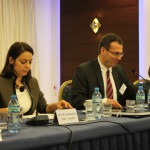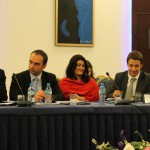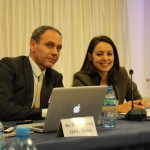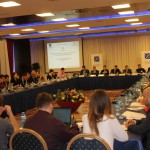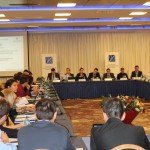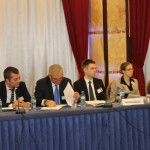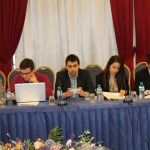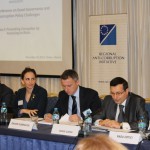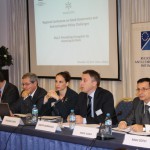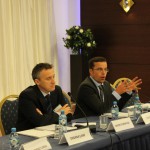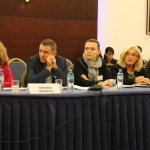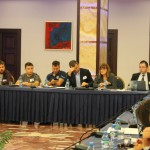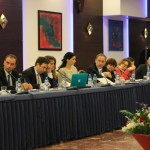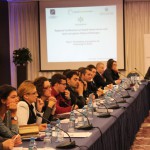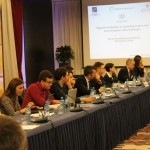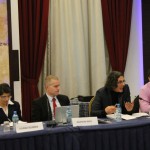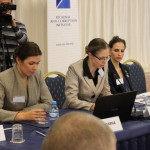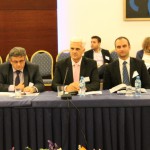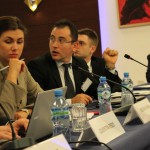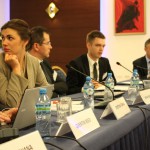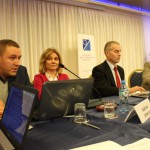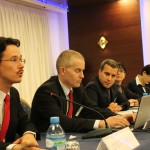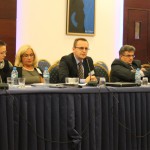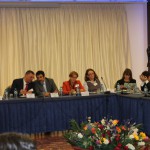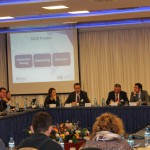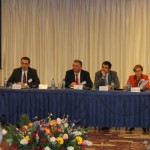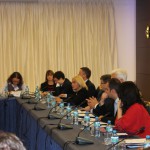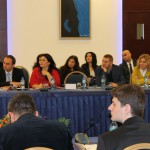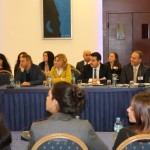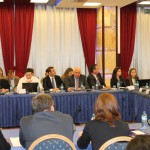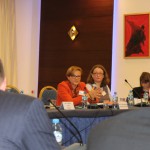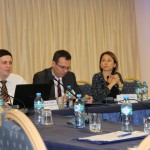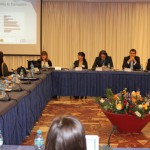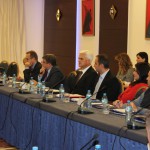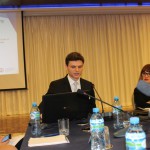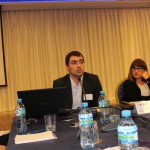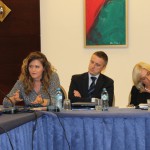Regional Conference on Good Governance and Anti-corruption Policy Challenges, November 13-14, 2014, Tirana, Albania
On 13 – 14 November, 2014, the Regional Anti-corruption Initiative (RAI), the Regional Cooperation Council (RCC), the Ministry of State on Local Issues of Albania and the Southeast Leadership for Development and Integrity (SELDI) co-organized the Regional Conference on Good Governance and Anti-corruption Policy Challenges. The two-day forum aimed at fostering civil society – state dialog in identifying effective measures to prevent corruption.
The first day event, Monitoring Corruption and Anti-corruption in Southeast Europe: Policy Challenges and the Role of Civil Society, was dedicated to the findings of the Regional Anti-Corruption Report and the National Corruption Assessment Reports for nine countries in Southeast Europe, as well as on specific ideas for countering corruption on a regional scale. Please download the presentations from the first day event here.
The second day event, Preventing Corruption by Assessing Its Risks, targeted at boosting countries’ efforts for corruption risks identification and mitigation in decision making process. The Conference recommended for use the developed by RAI and RCC Methodology on Anti-corruption Risk Assessment of Laws, adopted the 10 Ten Principles of Effective Corruption Proofing as an international standard in this field and recommended corruption risk assessment as a corruption preventive tool. For more information, please see Recommendations of the Regional Conference Preventing Corruption by Assessing Its Risks.
Ms. Eridana Çano, Director of Cabinet, Ministry of State on Local Issues, Albania, opened the event by underlining that the Office of the National Coordinator on Anti-Corruption is working with international partners and will use the best practices to tackle the corruption in the country. She expressed her support to the preventive measures, as well as her hope that the corruption proofing and corruption risk assessment becomes a systematically applied effort in all institutions.
Mr. Sokol Gjoka, Ministry of Foreign Affairs, Albania, underlined that CACP is the most important anti-corruption initiative in Albania. In its framework, the Ministry will become a coordination point for more than forty activities. Mr. Gjoka concluded his speech by noting the importance of the conference for providing forum for exchange of ideas on tackling the problem.
Mr. Gazmend Turdiu, Deputy Secretary General, Regional Cooperation Council, highlighted the efforts that the Council has undertaken and their positive effects, but warned that the situation in SEE has been worsened by the economic crisis. These developments made RCC update and finalise its Strategy with a focus on job creation, unemployment, and sustainable growth, similar to the SEE 2020 Strategy. Mr. Turdiu underlined that the fight against corruption has a center place in their Strategy, as it is essential for the economic growth and development. According to him, although the legal framework is important, a key prerequisite for the success of any anti-corruption policy consists of the closer collaboration between government, agencies, law enforcement and the civil society.
Mr. Davor Dubravica, Chairperson of the Regional Anti-corruption Initiative (RAI) recalled the Joint declaration of the Ministers of Justice and Home Affairs of the SEECP participating states from Bucharest, May 2014, in particular the pledge to foster the stronger regional frameworks for tackling corruption , as well as to allocate adequate resources for implementing efficient preventive mechanisms and programs, as well as proactive measures to enhance institutional transparency and good governance. He warned that laws can also be a source of corruption, and advised all countries to use the Methodology presented by RAI at the event, which was endorsed also at the Workshop in Becici, Montenegro.
Panel 1: Anti-corruption Assessment of Laws
Moderator: Mr. Davor Dubravica, RAI Chairperson
Mr. Radu Cotici, Head of Secretariat, Regional Anti-corruption Initiative (RAI) presented the concept of corruption proofing of laws and how effective it could be to prevent corruption. He provided examples on how inconsistent, unclear or contradictory texts of legislation may breed corruption. He expressed interest in learning more about the experience of Lithuania and Moldova, where the corruption proofing tool has been used for almost a decade. He underlined that the Methodology will work only when properly set up as a mechanism, when authorities take a serious approach in carrying it out and civil society stakeholders are involved and enabled to contribute to the review. For that reason RAI has developed its Methodology, as well as the ten principles of effective corruption proofing, that RAI calls to be approved as an international standard in this field. Please download the presentation here.
Dr. Tilman Hoppe, anti-corruption expert, presented a comparative analysis of the anti-corruption assessment of laws in different countries. He noted that little literature and information is available on the subject, which points out to the need of the further development and adaptation of the Methodology. Some of the countries that apply similar methodology include Russia, South Korea, Lithuania, Moldova, and Albania. Mongolia, Poland, Serbia and Turkmenistan are expected to adopt the corruption proofing soon. Dr. Hoppe underlined that although corruption proofing takes resources, it is still necessary. It should be done not only formally, but with the aim of increasing the impact of the law and its compliance. Please download the presentation here.
Mr. Ruslan Stefanov, SELDI Coordinator, noted that the corruption proofing of legislation is an instrument that allows civil society an additional venue to influence policy. This is of particular importance since the civil society has as key mission to be a watchdog and monitor the public policies. He underlined that more attention should be paid to the capacity of the bodies that should implement corruption proofing. According to him, the countries in the region need to achieve impact on the highest corruption levels and tackle the issue of state capture, which is in essence use of the legislative process to serve personal interests. Mr. Stefanov prompted the countries to apply these principles first to the existing legislation, and then proceed with the new ones. He advised that similar Methodology can also be used to enhance the regulatory impact assessment.
Panel 2: Anti-corruption Assessment of Laws: best practices
Moderator: Ms. Eridana Çano, Director of Cabinet, Ministry of State on Local Issues, Albania
Ms. Solėja Karalienė, Chief Specialist, Special Investigation Service, Republic of Lithuania (STT) shared her experience with anti-corruption assessment of legislation in Lithuania, implemented by a team of five people. She explained that though parliamentary group, Commission, parliamentary committee or the President, Chairman of the Seimas or Prime Minister or STT itself can initiate anti-corruption assessment of legal acts, this could leave some important legislation without a corruption evaluation. She warned that despite all good practices, one cannot believe that an assessment will eliminate all corruption factors. Please download the presentation here.
Ms. Cristina Tarna, Deputy Director, National Anti-Corruption Center, Republic of Moldova, stressed that there is a need of stronger corruption proofing mechanisms when an official can use interpretation of the law for own interest or gain. She explained that the corruption proofing process in Moldova was inspired and launched by CSOs in June 2006, and it was later adopted as government decision. It covers all laws and draft laws, except policy and singular use documents. The National Anti-corruption Center is in charge of the proofing implementation, starting from the moment a draft law is finalized. A law can be remedied even after it has been passed. Among the corruption risks assessed are: legal wording, legal coherence, transparency and access to information, exercising individual rights, etc. Currently there are 600 corruption proofing reports produced per year in Moldova, which rely on the help from all stakeholders, including CSOs. Ms Tarna noted that according to her experience there are two key specifics of approving draft laws promoting private interests – urgency for adoption and lack of transparency. In that respect the corruption proofing is the key in securing quality law drafting in the public interest. Please download the presentation here.
Dr. Tilman Hoppe, anti-corruption expert presented RAI’s Regional Methodology on Anti-corruption Assessment of Laws. His speech focused on what are the risks and how to identify them in a legislative text. He made a distinction between corruption of the legislative process and the involuntary discrepancies made in the text that present corruption risk. He expressed hope that the ten principles and the corruption proofing methodology will be adopted in all SEE countries. Please download the Methodology here.
Panel 3. Corruption risk assessment
Moderator: Ms. Cristina Tarna, Deputy Director, National Anti-corruption Centre, Republic of Moldova
Mr. Quentin Reed, anti-corruption expert noted that international standards for an ideal corruption risk assessment methodology are good for inspiration, but still not sufficient. He warned that the same solutions cannot work in the same way everywhere. In that respect, he recommended that the countries look at local problems, find local reasons and find local solutions. Rudeness, arbitrary treatment, obstruction are also factors that go hand in hand with corruption and should be taken into account in any corruption assessment methodology. Among the risk assessment methods that Mr. Reed presented were: use of existing materials, law and regulations, direct observation, proxies, surveys, interviews. Please download the presentation here.
Mr. Mihai Barlici, Head of Anti-corruption Studies and Prognosis Unit, Anti-corruption General Directorate, Ministry of Internal Affairs of Romania presented the methodology, results and efficiency of the self-assessment used by government bodies. As main vulnerabilities he listed the sectors with frequent contact with the public, financial management, public procurement. He presented the good practices in Romania, including formation of corruption prevention working groups, trained in recognising corruption risks. The Unit is trying to evaluate what the potential impact of certain corruption risk would be, including financial impact, public image impact, human resources impact, etc. A new activity for the Romanian Ministry of Interior was the deterrence of the risk, in which it is currently involved. Please download the presentation here.
Mr. Matjaž Mešnjak, Adviser on Prevention and Public Integrity, Commission for the Prevention of Corruption, Republic of Slovenia underlined that Slovenia performs corruption risk assessment almost every day as part of the existing integrity plans, sectoral analyses, and corruption investigations. The key instrument, the Integrity plans, include a matrix of risk factors, existing measures, as well as foreseen measures. The information is stored in a register, which soon will present all current corruption risk and measures in real time, and will allow for statistical and qualitative analysis. Results will be shared among the concerned entities, so that counter-measures can be undertaken. The Commission educated several thousand public sector employees in the last four years, built the e-register, revised integrity plans. It faced as challenges the constantly changing list of public institutions, and the hardships of convincing public sector managers that corruption risk assessment is important issue and that integrity plans should be used. Please download the presentation here.
Ms. Marijana Obradović, Assistant Director of Prevention Sector, Anti-corruption Agency, Republic of Serbia presented Serbia’s experience on the topic. The Law of the Anti-corruption Agency stipulates that all government bodies should develop anti-corruption plans and report on the implementation of these plans to the Agency. The Agency published guidelines for the implementation of the integrity plans in October 2010. These guidelines however proved to be insufficient, and task groups specific for each institution were formed, in parallel with the development of special software. Since there were no sanctions for not adopting the plans, many institutions decided not to do so. In that context the policies applied and the quality of the integrity plans depended on the understanding of the problem by the management of the government institution, as well as on the existence of external assistance provided by CSOs.
Mr. Milos Mojsilovic, Senior Adviser within the Research and Development Unit, Serbian Anti-Corruption Agency complemented the review of the Serbian experience. He explained that the Agency’s staff went and spent some time in each institution to see how it works and if the integrity plan reflects objectively how the institution is functioning. Another issue besides the efficient implementation of the integrity plans is the fact that in Serbia there is no law on whistle-blower protection, and the Agency is trying to provide internal solutions. In 2015 the Agency will monitor the implementation of the integrity plans and further promote the good practices and solutions. Please download their presentation here.
Panel 4. Corruption risk assessment – continuation
Moderator: Mr. Radu Cotici, Head of RAI Secretariat
Mr. Vasilica-Cristi Danilet, Member of Superior Council of Magistracy, Romania presented the history of corruption investigation in Romania. Until 2006 the Ministry of Justice had its own secret service, used to obtain information even of the private life of the judges, information that could be misused. Before the accession, the EU built pressure on the country for achieving results in fighting corruption. As result, Romania changed its Constitution, built special unit of young and clean prosecutors, trained to fight corruption. It formed the National Anti-corruption Directorate – an independent body. For many years after accession the pressure continued under the CVM. In that context Romania expanded its anti-corruption efforts and introduced objective criteria for appointment of judges, including an exam without influence by any political party. The country also introduced IT system in the courts and currently publishes online various kind of data to increase transparency. They try to maintain dialogue and be close to the citizens in order to raise the corruption awareness. The relevant authorities participate in TV shows, and talk with people through the social media. Romania has 1496 offenders convicted of corruption in the period 2005-2014, including 1 former prime minister and 6 ministers, as well as many judges and prosecutors. Consequently, trust in judiciary increased from 22% in 2005 to 44% in 2014. Please download the presentation here.
Mr. Quentin Reed, ACFA Team Leader talked about corruption risk assessment in Albania and presented the preliminary findings of the ACFA Project. The project mainly focuses on assessment of the anti-corruption framework, including asset declarations, conflict of interest, and providing assistance to the Anti-corruption Action Plan. Mr. Reed noted the problems with data exchange between institutions in Albania that obstruct the efficiency of the applied measures. Their analysis also focused on political party and election campaign, noting the insufficient capacity of the authorities to oversee the issue. Please download the presentation here.
Ms. Liljana Selinšek, anti-corruption expert, presented the different models and approached to corruption risk assessment (CRA). She confirmed the statement that no model can work everywhere, but the existing knowledge of corruption risk assessment is enough to identify a common goal. She stressed that the assessment should target not just corruption, but also integrity risks, and the countries need clear measures to eliminate the sources and the risks of ambiguity behaviours. She noted that freedom of information is essential for preventing corruption. Ms. Selinšek presented the integrity plan, the sectoral CRA, and the ad hoc CRA as three key promising approaches that can complement each other and efficiently decrease the corruption risks. According to her, a mixed system including these approached would be best suited for the region. Thus the mixed system can identify which factors drive corruption in each country and institutions, and assess the effectiveness of existing laws. Please download the presentation here.
Ms Daniela Mineva, Center for the Study of Democracy, SELDI Secretariat concluded with listing ten recommendations and conclusions from the conference, inviting the countries to consider introducing the presented corruption proofing tool and methodology.
During the closing statements Mr. Predrag Vujicic, Expert on Justice and Home Affairs, RCC underlined that the Council is trying to make the region a better place for living through joining efforts of all stakeholders. He wished the participants success in their efforts in fighting corruption.
For more details, please check the List of Participants, as well as the final Agenda of the event.
Photo Gallery


